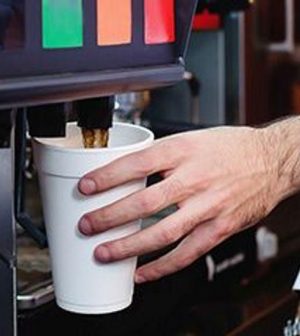- The Best Time of Day to Drink Bone Broth to Maximize Health Benefits
- 8 Ways to Increase Dopamine Naturally
- 7 Best Breads for Maintaining Stable Blood Sugar
- Gelatin vs. Collagen: Which is Best for Skin, Nails, and Joints?
- The Long-Term Effects of Daily Turmeric Supplements on Liver Health
- Could Your Grocery Store Meat Be Causing Recurring UTIs?
- Are You Making This Expensive Thermostat Error This Winter?
- Recognizing the Signs of Hypothyroidism
- 10 Strategies to Overcome Insomnia
- Could Artificial Sweeteners Be Aging the Brain Faster?
Diet Drinks May Thwart Efforts to Lose Weight

Trying to slim down? Diet drinks aren’t likely to help, researchers warn.
And those containing the artificial sweetener sucralose may even increase food cravings and appetite in women and people who are obese, according to a University of Southern California study.
“There is controversy surrounding the use of artificial sweeteners because a lot of people are using them for weight loss,” said corresponding author Dr. Kathleen Page, an associate professor at the university’s Keck School of Medicine, in Los Angeles.
“While some studies suggest they may be helpful, others show they may be contributing to weight gain, type 2 diabetes and other metabolic disorders. Our study looked at different population groups to tease out some of the reasons behind those conflicting results,” she said in a school news release.
In the study, Page’s team asked 74 people to drink 300 milliliters of fluid — beverages sweetened with table sugar, sucralose, or water (as a control). The participants did so at three different sessions.
In the two hours that followed, MRIs checked how brain regions involved in appetite and food cravings reacted when participants were shown pictures of foods like a burger and donut.
There was increased activity in those brain areas after women and people who were obese had drinks containing sucralose, compared with drinks containing real sugar.
And levels of hormones that tell the body “I feel full” fell after sucralose-containing drinks, suggesting that artificially sweetened drinks may not be effective in suppressing hunger. In addition, women, but not men, who drank sucralose-containing drinks ate more at the snack buffet, the study findings showed.
“Our study starts to provide context for the mixed results from previous studies when it comes to the neural and behavioral effects of artificial sweeteners,” Page said. “By studying different groups we were able to show that females and people with obesity may be more sensitive to artificial sweeteners. For these groups, drinking artificially sweetened drinks may trick the brain into feeling hungry, which may in turn result in more calories being consumed.”
The findings were published online Sept. 28 in the journal JAMA Network Open.
More information
The U.S. Centers for Disease Control and Prevention has more about losing weight.
SOURCE: Keck School of Medicine, University of Southern California, news release, Sept. 28, 2021
Source: HealthDay
Copyright © 2026 HealthDay. All rights reserved.










